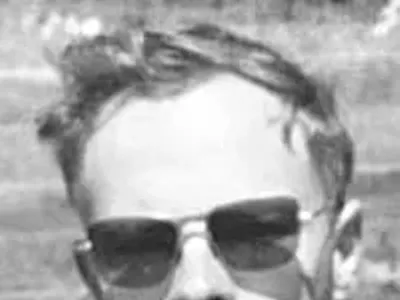If trumpeter Chet Baker had died in 1955, in his mid-20s, he would be remembered as a golden boy cut down in his prime, a player of much promise, unfulfilled. Musically, he would be pegged as an adept exponent of the West Coast cool school, too facile to make it into the pantheon but still a distinctive stylist, a wispy minimalist on the horn who sometimes switched to vocals and sang in an ethereally sweet manner. Culturally, he would be remembered as one of jazz’s great marketable personas, movie-star handsome, conveniently white and ridiculously charismatic, the combination earning him a brief popularity way out of proportion to his musical significance.
But Baker didn’t die until 1988, when he was nearly 60, a longtime junkie who defied death for nearly three decades, squandered his fragile talent and turned his chiseled pretty-boy looks into a grotesque death mask. His musical legacy, a dubious offering of arrested development and long descent, centers around a handful of early ’50s sides where his personal sense of tonal restraint often resembles a surfacey approximation of Miles Davis’ much more emotionally complex approach. But as an iconic figure he achieved a revival late in life as one of the great shambling wrecks of jazz, much admired, in Europe at least, as an egregiously tortured artist.
James Gavin’s biography of Baker is unstinting, alternately fascinating and tedious. The most interesting revelation, which comes long before the trumpeter’s life devolves into a seemingly endless loop of scoring dope and squabbling with his various wives and girlfriends, is the extent to which Baker’s addiction to heroin seems predetermined by his personality. Even before he takes his first hit, he seems like a hollowed-out guy.
Born in Oklahoma in 1929 to an alcoholic father and a well-meaning but overburdened mother, he displays a natural gift for the trumpet early on, as well as beginning a lifelong habit of never practicing, so uninterested in the mechanics of music that even during his glory days with baritone saxophonist Gerry Mulligan he could barely read music. It’s not that he was a dreamy, poetic youth who couldn’t be bothered by the more rigorous details of music making, but rather that he was a loutish bumpkin who preferred to fuck around, doing nothing in particular. Mulligan referred to his partner, whom he came to despise, as an “idiot savant,” while Mulligan’s wife and manager judged him to be a “talented imbecile.”
This is the first great irony of Baker’s life, that the callow youth who never grew up and preferred to goof off rather than practice was famous for his introspective, sensitive ballads. But there’s a difference between the hard work of self-reflection and the flaccid ruminating of self-regard, and Baker’s inward eye definitely tended toward the latter; it’s what gives his ballads their spooky sheen of pleasurable sadness, suffused with more prettiness than pain. Baker’s ruling emotion seemed to be self-pity long before his junkie exploits led him to (literally) get his teeth kicked out. Add to that a narcissism fed by the unearned attention gained by his good looks and you have a borderline sociopath in the making.
For a while, Baker was the right guy in the right place. His inarticulateness could be mistaken for the terseness of cool; his inability to make casual emotional connections could pass for hip nonchalance. In the early ’50s, in Mulligan’s pianoless quartet, his airy reticence is a smooth contrast to the sax player’s rigorous intellectualism. His singing is mellow without being saccharine, but more mannered than meaningful and full of the empty calories of gilded romance.
In a Blue Note release which corresponds to Gavin’s biography (and which is also called Deep in a Dream and is helpfully subtitled The Ultimate Chet Baker Collection), the emphasis is on Baker traipsing in a melancholy mode; presumably a sample of his harder-edged style, often evident when he was coming off a high, wouldn’t quite gibe with the popular posthumous image.
Gavin’s book is a long hard look at a junkie who happened to be a jazz musician rather than vice versa. The messiness of Baker’s life was positively baroque and the details can wear you down. Nobody ends up looking good, certainly not Baker, who battered his lovers and scammed his friends, and not the lovers or friends who hung around way past the point of reason. At this point one is supposed to say, “at least we have the music,” but the music seems to me to be exceedingly thin gruel to have been squeezed out of such a disastrous and damaging life. There are many, of course, who feel otherwise.
E-mail Richard C. Walls at letters@metrotimes.com.






